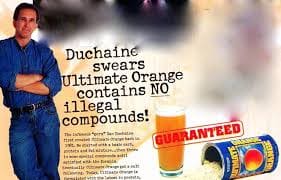Energy Drinks: Science, Hype and My Take
by: Josh Bryant

Ultimate Orange: The Original Preworkout, with a little more than just caffeine.
Back in 2001, I was rolling through Ozona, Texas, on one of those road trips where the gas stations are the only landmarks. I pulled into a truck stop for a bite to eat—one of those places where the menu is handwritten, and the cook looks like he moonlights as a bare-knuckle boxer.
Out front? A mix of methheads and lot lizards giving me the once-over. One of them said, “You look too tired and too nice for the hard stuff,” and handed me a fluorescent-colored drink in a can. Out of curiosity (and the need to stay awake), I pounded it. Within minutes, I felt like Superman—invincible, wired, and ready to take on the world.
That was my first taste of an energy drink.
It wasn’t the Ultimate Orange that old head, 1990s lifters still get misty-eyed about, but it hit me like a triple-scoop pre-workout mixed with bad decisions. Fast-forward a quarter century, and these drinks have gone from a roadside curiosity to a multi-billion-dollar industry, hyped as the secret weapon for athletes, truckers, and tired office workers alike.
Here’s the deal: are energy drinks just “meth in a can” that wreak havoc on your health and somehow give you venereal diseases via directed energy osmosis, or are they benign—or even healthy? Dr. Jose Antonio—a true powerhouse in sports science—dug deep (Nutrients, 2025). Let’s separate the science-backed truth from the marketing smoke and mirrors.
What’s Really in Energy Drinks?
The backbone of any energy drink is caffeine, sometimes sugar, and a few supporting players like taurine, B vitamins, and the occasional sprinkle of “exotic” ingredients like guarana. But let’s call it like it is—caffeine is doing all the heavy lifting. Most energy drinks pack about 80–150 mg of caffeine per serving, similar to a solid cup of coffee, though it’s not unheard of for some to pack triple that punch.
The rest? It’s more about marketing than muscle. Taurine, for instance, gets a lot of credit but contributes minimally to performance. B vitamins? Unless you’re deficient, they won’t turn you into an all-star. It’s like putting racing stripes on a tractor—it looks cool but doesn’t add horsepower.
Do Energy Drinks Work? Here’s What Science Says
Performance Boosts
For endurance activities, energy drinks can deliver. They’ve been shown to improve time-to-exhaustion and reaction time. If you’re grinding through a long run, bike ride, or even a marathon bench session, that caffeine can make a real difference.
But for pure strength and power? The results are modest . You might grind out an extra rep or two, but energy drinks aren’t the secret to breaking PRs. They’re a crutch, not a foundation.
Fat Burning
Energy drinks are marketed as fat-burning elixirs, but let’s cut the crap. While caffeine can give a slight nudge to calorie burn, it’s not a magic fat-melting potion. Real results come from a solid caloric deficit and a sound training plan. Nutrition and hard work move the needle—not the can in your hand.
Focus and Alertness
This is where energy drinks shine. Caffeine reliably improves reaction time, focus, and alertness, making it a useful tool when you need to be sharp. But again, you could swap the energy drink for a cup of black coffee or a caffeine tablet and get the same results.
The Risks You Can’t Ignore
Energy drinks aren’t all sunshine and gains. Here’s the fine print:
- Cardiovascular Stress: They can spike your heart rate and blood pressure, which might not matter if you’re healthy, but could be dangerous if you’re dealing with underlying heart issues.
- Sleep Disruption: Caffeine’s half-life is about 5–6 hours. Slam an energy drink too late in the day, and it’s you, the ceiling, and four hours of tossing and turning.
- Pregnancy: If you’re expecting, energy drinks are a hard no. The risks aren’t worth it—for you or the baby.
Energy Drinks vs. Coffee: Who Wins?
The research is clear: caffeine is the real MVP. Energy drinks don’t outperform coffee or caffeine pills—they just come with more additives, flashy branding, and sometimes more risks. If you want the performance perks without the fluff, coffee’s your best bet.
My Takeaway
Energy drinks aren’t all bad—they can be a useful tool when used sparingly. But don’t let a slick label fool you into thinking it’s the key to athletic greatness. Gains come from the basics: smart training, disciplined recovery, and solid nutrition.
The next time you’re tempted to grab a can, think back to those methheads in Ozona. A moment of feeling like Superman is fine, but long-term strength and success? That comes from the stuff you do every day—not what you drink on the fly.
One thing that’s pure results, not hype—my training programs. FIND THEM HERE!

Source: “Common Questions and Misconceptions About Energy Drinks: What Does the Scientific Evidence Really Show?” by Jose Antonio et al., Nutrients, 2025.
